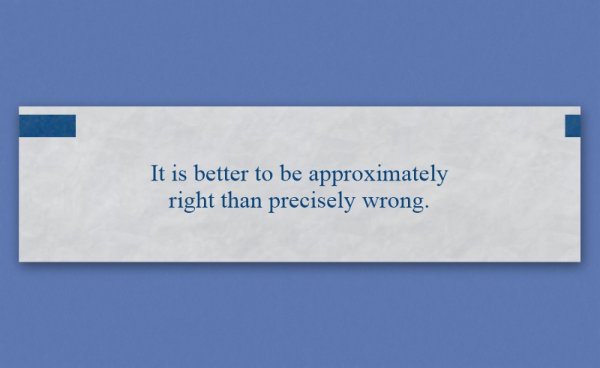Fortune Cookie Friday: Generally Speaking
I recently had some new windows installed in my home. They are lovely and energy-efficient portals to the busy county road outside my domicile. Everything would have gone well with the installation except that the gentleman that measured them weeks ago made some mistakes. He measured my living room windows one inch too short.
Most carpenters learn to measure twice, cut once. The tradesman should have double-checked his measurements. But he didn’t, and now I have to wait two additional weeks for the correct replacement windows
As I was dealing with this little debacle, the great creator of the cosmos threw this little fortune in my lap. Many people attribute the saying to the famous economist and early statistician, John Maynard Keynes, but philosopher and logician, Carveth Read, was the first to quote a version of it.

Unless we are dealing with exact measurements, as in the case of my windows or filing our taxes, approximations are good enough in our day-to-day lives. We can get by in a world with a dash of spice and not parking exactly between the yellow lines. As long as we can get in and out of the vehicle and not cause any damage, we’re good. No one is casing the parking lot with a tape measure ready to pounce on the first driver to park off-center.
By approximating things, we reduce the unnecessary stress of exactness and accomplish tasks at a faster pace. This behavior spills over into how we deal with life and the world around us. We generally look at things with a wide lens and only focus when we need to be exact. For the most part, we glean enough information to go about our daily lives.

We live in a world of generalization. Most marsupials are from Australia. Most animals in the arctic regions are white. Most of the calls to my home landline—yes, I still have one—are spam. We make these generalized statements by inferring from the information we know or collect.
For the scientifically or mathematically inclined, we live in a world of averages. Although, Carveth Read states in his book Logic – Deductive and Inductive, “The nature of an average supposes deviations from it.” Translation: There are always exceptions to the rule.
Generalizing can be good and bad, depending on how we use it. We need to be cautious about how we think. We shouldn’t assume all slow drivers are elderly, introverted people are quiet, or women are more empathetic than men. These generalizations can lead to prejudice and be harmful to others. Remember, there are times that we need to use a proper lens and focus our views. That way, we won’t assume every person with tattoos is a criminal and instead consider asking about their story behind the art—because there’s always a story.

Generalization can be useful and make life a little easier by helping us predict what will happen next. Generally, drivers aren’t on the lookout for pedestrians all of the time. Because of this knowledge, we look both ways before we cross the street. Not all drivers are bad, but we can’t know all of the information about a person or condition, and generalizing helps us make decisions faster.
It’s not uncommon for us to unconsciously generalize, approximate, or assume. There are also times we over-compensate because we don’t have all of the information we need. The fear of error or mistakes, and ultimately the judgment of them, leads us to speak vaguely, but safely, especially in times of vernacular prudence.
For example, we say we “spoke to a person on the phone” as opposed to mistaking their gender because they had a high pitched voice. We can be vague when a friend asks for our opinion, and we don’t want to hurt their feelings.

Facts matter and empirical evidence are preferred over hypothesis, but in the everyday world, it’s tough to be spot on. Nobody’s perfect. Striving for perfection all the time can lead us down a slippery, miscalculated slope. If we aren’t careful, we end up being egregiously wrong, and nobody wants to be there.
We do our best in life, but it can be difficult. We try to be informed and not ruffle the feathers of those around us. Is it better to be approximately right than precisely wrong? I can safely answer that the statement is mostly correct, but I’ll conclude with a quote by Mark Twain: “All generalizations are false, including this one.”




